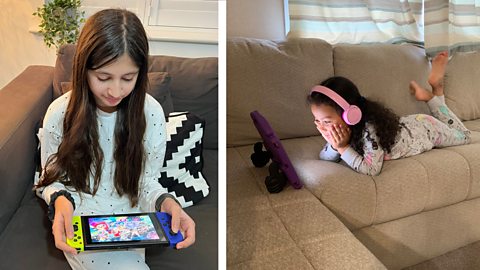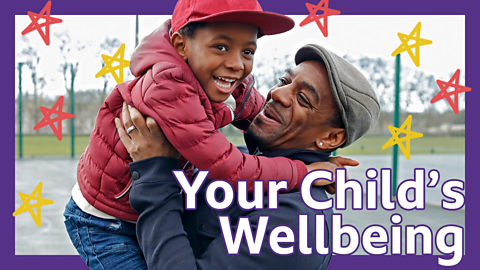Moving from primary school and into secondary school can be an overwhelming time for kids as their online world opens up, particularly if they’re getting their own phone for the first time.
We worked with Internet Matters to come up with some advice on how to support them.
Cat Sandion: Hello, my name is Cat Sandion and I am a TV presenter, a performer and, also, a mother. BBC Own It have partnered with Internet Matters, who are experts in ensuring parents and kids have the best online experiences, to share tips to help you and your child make the most of their digital world. In this film, we'll talk about the transition to secondary school and how it may open up your child's online life.
Title: Transitioning from primary school to secondary school
Moving from primary school and into secondary school is an exciting and scary time for any child. It's also a time when kids will get their own device for the very first time for keeping in touch with parents and carers, and new and old friends. Around this time, children are also learning the rules to social connections and how they should interact with each other online.
Having the right phone, being on popular apps and using the right language when they're chatting to their mates, these things can be very important to a child and sometimes overwhelming, it's all about 'fitting in'. So, from managing screen time to dealing with peer pressure, here's some tips and advice to help you support your child.
Title: Impact on wellbeing
There is so much your child can do and access in the online space, from using social media, streaming films, to watching clips on YouTube, staying connected with friends and family, gaming and even doing homework. It's important to have a conversation when you give your child their device about setting limits on time spent on their phone, as research has shown that children's brains, behaviour and sleep can be affected by how much time they spend on screens.
Also, remind them that most apps and games are designed to keep them scrolling, watching and playing. Agree the limits on time together so they feel they are able to own their choices.
Title: Exposure to online risks
Talk about online risks, such as inappropriate content and cyberbullying. Over 60% of kids said that they are more careful about what they share online because of people being mean to each other based on who they are. According to OFCOM, 66% of 8-11 year olds say their is pressure to be popular on social media.
From chasing likes to taking part in risky online behaviour, at this age, children are starting to learn about what is acceptable behaviour but feel a pressure to join in. It's really important to let them know that they can come to you if they have any problems in the online world.
Title: Spending too much time online
Endless scrolling is an issue for kids and adults too. Make sure that your child is aware that platforms are designed to keep them viewing.
Title: Watch out for false or misleading info!
It is important that children use trusted sources for information. Encourage them to think critically about what they are viewing or reading, so they're not enticed by false or misleading information that they share with others.
Title: Stay up to date with online trends
Having that early conversation and continuing to talk to your child can keep you informed about what they are doing in their online lives. Get up to speed on age restrictions for social media apps. Learn a bit about the platforms and apps that your child is using. Remind them that they can come to you if they get into any trouble online.
1. Wellbeing and screen time
It’s worth having a conversation with your child about setting limits on time spent on their devices. Research has shown that children’s brains, behaviour and sleep patterns can all be affected by how much time they spend on screens.
Top tips for managing time online with friends.
Platforms are often designed to keep us scrolling, so make sure your child is aware of this and try to agree limits on screen time together.
2. Risks
Talk about online risks such as why bad things get clicks and cyberbullying.
According to Ofcom 66% of 8-11 year olds say that there is pressure to be popular on social media. Children often feel like they have to fit in and earn ‘likes’, which can lead to risky behaviour.
It’s really important to let them know that they can come to you if they have problems online.
3. False and misleading information
Encourage children to think critically about what they are viewing or reading online, so they’re not tricked into reading and sharing false or misleading information. Click here for more information on fake news and clickbait.
4. Keep up to date with online trends
You don’t need to be TikTok or Twitch royalty, but by continuing to talk to your child about the latest platforms and apps they can keep you informed about what's going on in their online lives.
Further information
Internet Matters have a helpful online safety guide for children making the leap from primary to secondary school.
They have also designed an on-site tool that provides parents with personalised online safety advice to help support their children online.
Why not check out some of the other episodes in the series?
What games are your kids playing online? discussing how kids are gaming.
Originally published as part of Own It - the BBC's place children can find help, support and advice on how to live their best and safest online life.
Check out the CBBC Gaming Hub with your child to explore articles all about gaming, cool clips, and even games to play!

More from BBC Bitesize Parents' Toolkit…
Parents' Toolkit
Fun activities, real-life stories, wellbeing support and loads of helpful advice - we're here for you and your child.
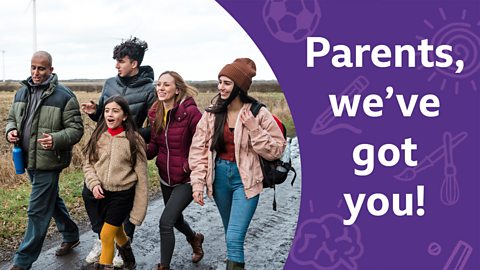
Five things to consider when buying your child their first mobile phone
Whether they're starting secondary school, or at primary school - at some point parents will almost inevitably have to consider buying their child a mobile phone. Here are some tips and expert advice on what to consider.
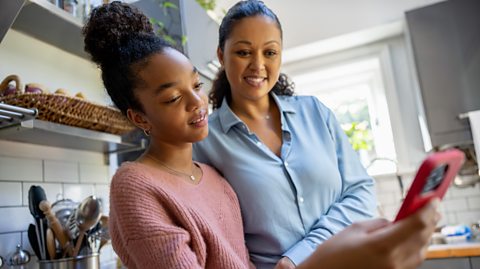
How technology has made parenting more difficult and how to navigate it
BBC Bitesize Parents' Toolkit looks at how widespread access to the internet for our children is causing clashes at home, with negative and positive aspects.
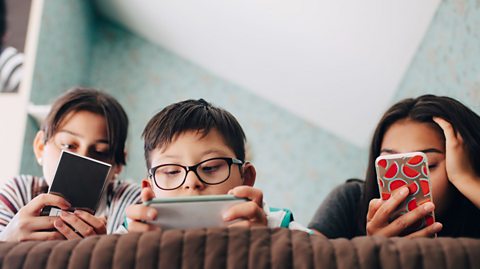
How to manage your child’s online world without clashing
Children and teens spend lots of time online for school and leisure, which can be a worry for parents. Here's some advice on managing your child’s screen time.
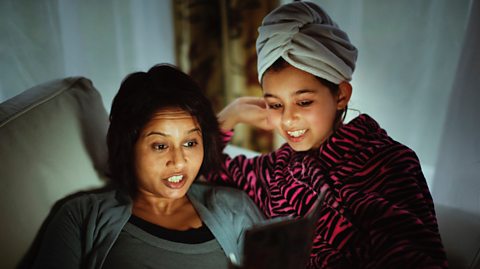
Dear Parents' Toolkit... How much screen time is too much?
Parents across the UK share their thoughts on screens and internet safety. Should I use them in parenting? What is 'screen guilt'? And how do I get my child away from them?
